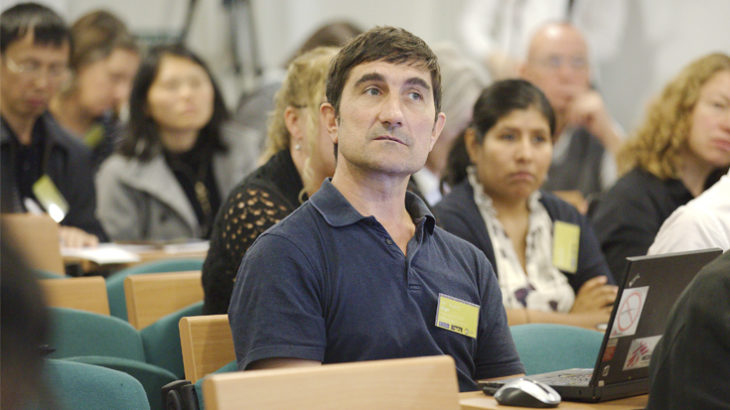Guest Post: The Nuanced Nature of Data Collection

Elizabeth Kullmann is a postgraduate student in Criminology and Criminal Justice at the University of Oxford. Here she talks about her visit to The Data Dialogue: When Research Crosses Borders and what she took away.
As a postgraduate student at University of Oxford embarking upon an MSc in Criminology and Criminal Justice, I am rapidly developing a love of data. At the moment the MSc course is mostly taught and seminar-based, however in the final term, we are expected to write a dissertation that may rely on the use – and potentially gathering – of empirical data. As such, the idea of The Data Dialogue seemed like something I should familiarise myself with.
The Data Dialogue was first introduced to me by Mary Bosworth, who was speaking at the event about the ethics and challenges of conducting research in immigration detention centres. My future research is concerned with the policing of borders and the effects of migration policy on foreign national prisoners, therefore it seemed a fantastic opportunity to hear more about Mary’s work and the dilemmas that she faces when conducting research in this hard-to-reach setting. I was hoping for an insight into how to gain access to this research field as well as how to collect data and ultimately, what to then do with it – so, not too demanding… Fortunately the whole event provided far more information on top of that! The event focussed on the international and transnational nature of research, its impact on data collection and how to interrogate and handle the data collected.
“…an invaluable insight into the complex and nuanced nature of data collection”
Though I primarily came to hear the talk given by Mary Bosworth, which was very much directly relevant to the research that I will be undertaking in the future, I took a lot away from the entire event. The Data Dialogue event that I came to attended was interested in the international and transnational nature of research and the impact this has on data collection as well as how to deal with data.The Data Dialogue: When Research Crosses Borders brought together some fantastic speakers from a wide range of disciplines and this was really emphasised by the diverse range of subjects covered. Dr Troy Sternberg spoke about the challenges he faced when collecting geographic data in two very different Mongolian settings, with a core component of his argument suggesting that social, economic and political contexts must remain at the foreground when recording and interpreting data from such distinct fields. Gareth Knight then introduced some practical challenges encountered by health researchers when working with digital data in developing countries. This highlighted the need for stringent data management plans and the need to gain an understanding of different data protection laws that exist in the jurisdiction where the research is carried out. On a more fundamental level, Gareth Knight emphasized the practical hurdles that researchers face when conducting research in remote international areas such as Ethiopia. Finally, Dr Julia Viebach presented her research on Gacaca courts in post-Genocide Rwanda. This was a particularly compelling presentation that brought to light the potential consequences of data collection. Issues of trauma, objectifying painful memories and ethics of data collection were brought into question, particularly in terms of data sharing. Though researchers should avoid becoming ‘data imperialists’ (retaining information for themselves), it could be argued that some data, particularly small scale ethnographic and qualitative data, should not be shared in order to avoid risking anonymity of participants or further victimising participants by objectifying their trauma and pain.This event opened my eyes to some of the many issues that researchers face when embarking upon data collection. From the practical to the emotional – with all the legal, ethical, political hurdles along the way The Data Dialogue sparked an interest in data (that was previously unbeknownst to me!). The panel discussion that concluded the day left me with many ideas, questions to ponder and ultimately made me think of what kind of researcher I want to be as well as how I will approach research in the future. As I am currently searching for and applying for DPhil and PhD funding, the subjects uncovered in the panel discussion were particularly resonant – will I be able to use existing academic data to save on costs of conducting my own empirical research or will this data be out of bounds due to issues of ownership and data protection?
Would my using existing academic data step on any toes or would it do the opposite – build on existing knowledge and extract maximum value from already available data? Difficulty gaining access to research fields and lack of funding opportunities in academia mean that it is increasingly important to be innovative and somewhat shrewd when it comes to data collection. Collaboration between academics and increasing data sharing prospects could be effective options to deal with the aforementioned obstacles faced by researchers.
Overall, I view The Data Dialogue event as having provided an invaluable insight into the complex and nuanced nature of data collection, as well as the even more problematic aspect of data sharing. Moreover, what I heard at this event will help me when it comes to tackling my own research in the future. The concepts and hurdles discussed will no doubt help me to shape my methodological approach to research as well as the way in which I manage data collection. This sort of event is beneficial not just for professionals and academics but also to those who are just starting out, like me! Thank you to all the speakers that contributed to The Data Dialogue and to Sigourney Luz, Myriam Fellous-Sigrist and John Southall for organising it.

